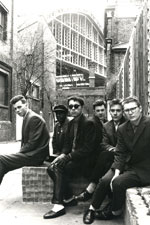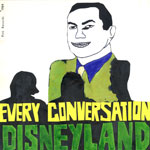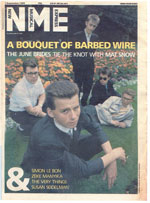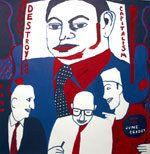
The June Brides, like Manchester, have so much to answer for, at least for me. Clutching the double cd retrospective Every Conversation: The Story Of The June Brides and Phil Wilson in my clammy palm I feel a total mish mash of emotions – elation, excitement, sadness, panic even! It’s been almost 21 years since I first stumbled upon them, on a cassette featuring a bunch of stuff recorded from John Peel’s Radio One show, then running from Monday to Thursday in the 10 til midnight slot. I can’t recall what else was on the tape but interspersed over one side was the one and only session the Junies recorded for Peel and the four songs blew me away. I’d been drifting through school, through life basically, searching for some kind of identity that didn’t involve absorption into the pseudo-football hooligan style that was so popular back then. Reading seemed to offer a partial escape, I’d drifted out of my previous musical passions (Adam and the Ants and Two-Tone and although I’d dabbled in a few things including a youthful dalliance with the poppier end of goth, nothing really spoke to me in the same way as those Specials, Selector, Jam and Madness singles had a few years previously. I quite liked what little of The Smiths I’d heard though I didn’t particularly understand a lot of the lyrical references, then the neds started to ‘dig’ them (though I doubt they ever got them) and I moved on.
Then these four songs, tales of everyday life, confusion and yearning, with their scratchy guitars, slightly flat but passionate vocals and blasts of trumpet not to mention a strange instrument that I later discovered was a viola, seemed to offer me a narrative to a different world, one which I could be a part of. They appeared otherworldly yet strangely pop, music for the head and feet. They appeared to be love songs but not in that unrealistic saccharine boy-meets-girl-girl-dumps-boy teenage fantasy way. Instead they seemed more rooted in the way that life was beginning to seem slightly messy and sometimes harsh but just so damn important. ‘We belong’ with its poignant lines
When love is down upon upon the laundry list,
There's nothing wrong, we belong,
All the things I thought I might have missed,
are gladly gone, we belong
offered defiance not despondency. ‘Waiting For A Change’ and ‘This Town’ perfectly described the ennui of small town life. All four songs were wrapped up in joyously buoyant tunes; honey laced with poison.
Listening to them now on a shiny digital disc without the hiss of cheap C90 cassettes and a poor radio signal I still love these four songs, they still provoke an array of mixed up emotions in me… In these strange times where love is a fickle thing, where passions burn brightly, flicker then die as suddenly I can declare with my hand on my heart that I have, more or less, been faithful to the June Brides for 21 years. If there have been times I have seemed to have forgotten them they haven’t lasted long at all…

… Then again the bastards never stuck around long enough to provoke arguments, moments of doubt, regret or embarrassment. Between my moment of aural epiphany in late 1985 and the band’s sudden demise in July 1986 I eagerly sought everything I could by the band. Admittedly it didn’t amount to much in the end in terms of quantity – four singles, a mini-album, two Radio One sessions and some cherished cuttings. These were my love letters and photographs, snapshots of my first grown-up love affair. Like the shy, insecure youth I was, I never wrote back declaring my true feelings – how could I? My inarticulate words and actions could never reciprocate such offerings of love. The affair ended with the release of the gorgeous ‘This Town’ single and a few lines in the N.M.E., something along the lines of the band ‘have decided to part company and become a legend!’ Okay, so I’d been cheating, playing the field and having flings and affairs with other bands, sometimes deep and intense, though often, as is the case with these things, I swear they didn’t really mean anything. I swear I loved you the most… those one night stands were just a quick diversion, they didn’t mean that much to me, did they?
For often the June Brides pointed me in other directions. They weren’t elitist. Interviews talked of influences, buzzed with ideas and suggested ways forward for music. They talked excitedly of how they had come to music inspired by the post-punk scene (I was barely coming to terms with punk, that would come in the summer of 1986 with Peel repeating classic sessions – Ruts, Gang Of 4, Undertones – and the ‘Punk’ programme which was compiled from the archives of Tony Wilson’s local show, ‘So It Goes’. Nostalgia was a far more tasteful beast then, it’s hard to see anyone being inspired to arms by ‘I Love 1976’ is it?), of how they wanted to inspire people to go away from their gigs thinking ‘that looks easy, I’ll form a band’. Latterly Phil Wilson admitted disappointment in playing alongside bands that had adopted the basic framework of his band – the jingly guitars – diluted it and failed to add anything of their own to it. These were often the bands rapidly finding favour in the ‘alternative’ or ‘independent’ scene of the mid-1980s. The June Brides pointed me back to Postcard groups such as Orange Juice and Josef K, the maverick Subway Sect, The Go-Betweens who bridged that era into the present and their contemporaries the Jesus and Marychain, with whom they had twice shared a stage. Yet these influences didn’t overwhelm them, instead they simply became the raw ingredients of an original sound. The trumpet and viola gave them an edge on their contemporaries and imitators but without such great songs, imaginative arrangements and fantastic performances they would merely have been gimmicks. Just listen to the first song on Every Conversation, their debut single ‘In The Rain’. It aches with longing and desire, the harsh guitars offset by some gorgeous viola. Then, without warning, it drops to just bass and drums before the vocal returns quiet and resigned before the song bursts back into life, joyous, raucous, uplifting and offering hope in the face of adversity:

‘In The Rain’, in just under four minutes, offers more than most bands can offer in an entire lifetime. Yet this was just an opening salvo, the June Brides had much more in their locker to offer. Each single, ‘Every Conversation’, ‘No Place Called Home’ and ‘This Town’ all being as perfect moments as the debut, building upon it without any signs of diminishing returns. Oh, and did I mention that the June Brides didn’t do throwaway B-sides? Well they didn’t. Their brief career saw the release of eighteen songs (nineteen if you include the cover of The Radiators ‘Enemies’ on There Are Eight Million Stories) and each one sounds as fresh, exciting and vital now on compact disc as they did first time around and over the ensuing decades even.
So, to go back to the opening line of this piece (yeah, I guess you’ve long since realised that this isn’t going to be a straightforward telling of the story – the sleeve notes do that perfectly – or a track-by-track review, either that or you gave up reading ages ago) what exactly do the June Brides have to answer for?
Well for a start, I can lay the blame for the awful crime against music that was Carter the Unstoppable Sex Machine. Despite a lack of promotion and stingy recording budget the June Brides first label Pink shifted heaps of copies of There Are Eight Million Stories (estimated to be anything between 30-60,000 copies). Did the band see any of this? Did they heck! The money was redirected into label boss Simon’s promotion of his personal favourites Jamie Wednesday and McCarthy, bands he never tired of telling anyone who could be bothered to listen, were miles better than the June Brides. Jamie Wednesday featured both members of Carter, and while their singles were pleasant enough they didn’t particularly sparkle or light up the independent charts. Carter, on the other hand were dire, a bad joke excruciatingly executed. It’s a sobering thought that the June Brides who deliberately eschewed the posturing laddishness of many other bands funded the embryonic pop careers of the laddish, dull Jimbob and Fruitbat but that’s life eh? That aside, McCarthy developed into a fine band and gave us Stereolab but that’s another story…
Joking aside, the June Brides anyone-can-do-it-just-do-it ethos encouraged me to begin publishing a fanzine, promote live bands, d.j., start a record label and form several bands. Like the June Brides most of my attempts were doomed to failure to a greater or lesser extent, although most were the source of great pleasure along with sleepless nights and financially bereft states. The June Brides loyalty to the independent scene probably mitigated against their longevity as a band as they soon discovered that a lack of scruples and morals was not just exclusive to employees of major labels. At least they only funded Jamie Wednesday, not companies with interests in arms dealing or apartheid South Africa. In an interview with one fanzine, the June Brides pointedly remarked that, as much as they loved the Clash, they felt there was a falseness and contradiction inherent in a band criticising the culture industry in songs like ‘Complete Control’ or singing about playing in their garage while being signed to a major label operating as part of a multinational conglomerate with fingers in many unsavoury pies. Heady times indeed. Now we just expect our artists to scribble something on their hands. The June Brides perhaps didn’t even come close to destroying capitalism but displayed a political awareness and personal integrity that most artists and musicians today would struggle to comprehend. In the mid to late 80s many bands would attempt to square the circle, moving from independent to major labels and the majority would get their fingers and toes singed before sloping off into obscurity. The June Brides stayed loyal to the independent ideal and got their fingers and toes toasted before… well you get the picture!

At the time I wasn’t fully aware of all the ins and outs of the bands dealings with record labels, I was just gutted that they had split up so soon – too soon. There would be no more gigs, records, whatever. All I had were four measly singles and an all to brief mini-album. ‘This Town’ was the perfect swan song but really it should have been the beginning of a new trajectory for the band. I took little consolation in the bitter irony that two of my favourite bands, the Specials and the June Brides, had bowed out with singles featuring the word ‘town’ in their titles. One was number one for six weeks, the other barely dented the independent chart.
In a way I guess it was the start of something new. Less than a year later Phil Wilson appeared on Creation as a solo artist. I eagerly purchased both singles, ‘Waiting For A Change’ and ’10 Miles’ and adored them. ‘Waiting For A Change’ was a gorgeous re-working of a June Brides track, heavily countrified. The response to it was muted, there were rumours that it was recorded and released as a joke in order to piss off die-hard fans. Me, I thought it was elegant and sweet. The follow-up, ’10 Miles’ was a more raucous affair, a musically upbeat, but lyrically, very downbeat song with fantastic production. On the surface, the words seemed to be about the end of a relationship, but it could be with the music world as much as an individual:
I struggle for a word of truth, you have less to
say,
And in the end we'll waste our youth, there'll be hell to pay
Stand so close, but never stand together,
Hand in hand but 10 miles apart,
Curse this life, but talk about the weather,
Hand in hand but falling apart.
Sales of both singles were poor and gigs sparsely attended. The much-discussed solo album never occurred and really that was it. There was a final single released on Bob Stanley’s CAFF label, which I’d never heard until now, with only 1,000 copies pressed. Featuring just Wilson and Primal Scream’s Andrew Innes, ‘Better Days’ and ‘The Written Word’ are polished home recordings, albeit great songs. With lyrics such as
My dreams and plans slipped through my hands
I can’t find the place where I belong
Seemingly a million miles away from the defiance of ‘We Belong’ the few people who deigned to review the single quite correctly read it as an epitaph for Phil Wilson’s recording career. Yet the following lines
A song of hope and rapture
I hoped to capture
It seemed worth it just to try
offer a sense of muted optimism. Whether Wilson feels he succeeded or not, I’m not sure but in my opinion he did. The song ends with him singing ‘I was wrong after all’ but in reality it was everyone else who was wrong. The country tinges to the solo material seemed to be interpreted as a red herring, an insincere move away from the June Brides sound but listen to some of the arrangements and songs on Every Conversation and it’s there in the music all along, just not as obviously. Finally, these are beautiful, heartfelt songs, not ironic po-mo posturing. In the end, as with the June Brides, Phil Wilson’s solo career simply fizzled out. Alan McGee lost interest, Wilson likewise. I was doubly gutted. Neither the June Brides nor Phil Wilson left the legacy of a full album and I’ve often whiled away time wondering what both would have sounded like over the length of a long-player. Perfect. Probably. We’ll never know.

Every Conversation isn’t either of those albums: it’s too disparate for that, despite only spanning a brief period of time. It is essential listening for fans and virgins alike, careering from edgy, raw melodic post-punk pop to edgy, raw melodic country pop. I do wonder to myself what would some lost fifteen year old make of these songs in the present. Would they be attracted to the energy, the tunes and lyrics? They seem timeless to me but of another time and place now as well. Snippets of an underground that you had to work hard to discover but dig deep and there were diamonds to be found. It’s easier now to hear bands, to discover all kinds of information and that’s a good thing. I genuinely believe that. I also believe that it’s harder sometimes to make sense of the cacophony of competing narratives, genres and sub-genres in order to discern a practical aesthetics or politics. Or was it always the case? There Are Eight Million Stories. This release contains two interlinked stories over forty-one chapters. Each one is worth hearing and holds up to continuous repetition over the years. So, you may ask, what kind of story is it? A legend, a success story or a morality tale? All of these and none.
The June Brides a legend? I guess they are in the circles where it matters.
The June Brides a success story? In many ways, yes. They may have failed to trouble the charts, they certainly won’t be appearing on ‘I Love 1985’ but they succeeded in releasing perfect pop records and their leaders ambition was to make one single so there you have it.
A morality tale? Nah, let’s not go there.
In the end, it’s a love story.
A band who could take desperation, marginality and a fight against the odds to make something defiant, uplifting and beautiful. ‘In The Rain’ perfectly encapsulates this, veering from fear to defiance. It begins desperately with ‘I fall, and you drag me down’ but turns this around into something more special, against all odds:
We'll make the sunlight shine for us,
we'll make the waves break for us.
We can choose to lose or win.
We can refuse to be shut in.
Perfection.
Oh, and I never did write to the June Brides or until now write about them… Plenty of others have done over the years but this is my love letter to them.
© 2006 Andy Wood